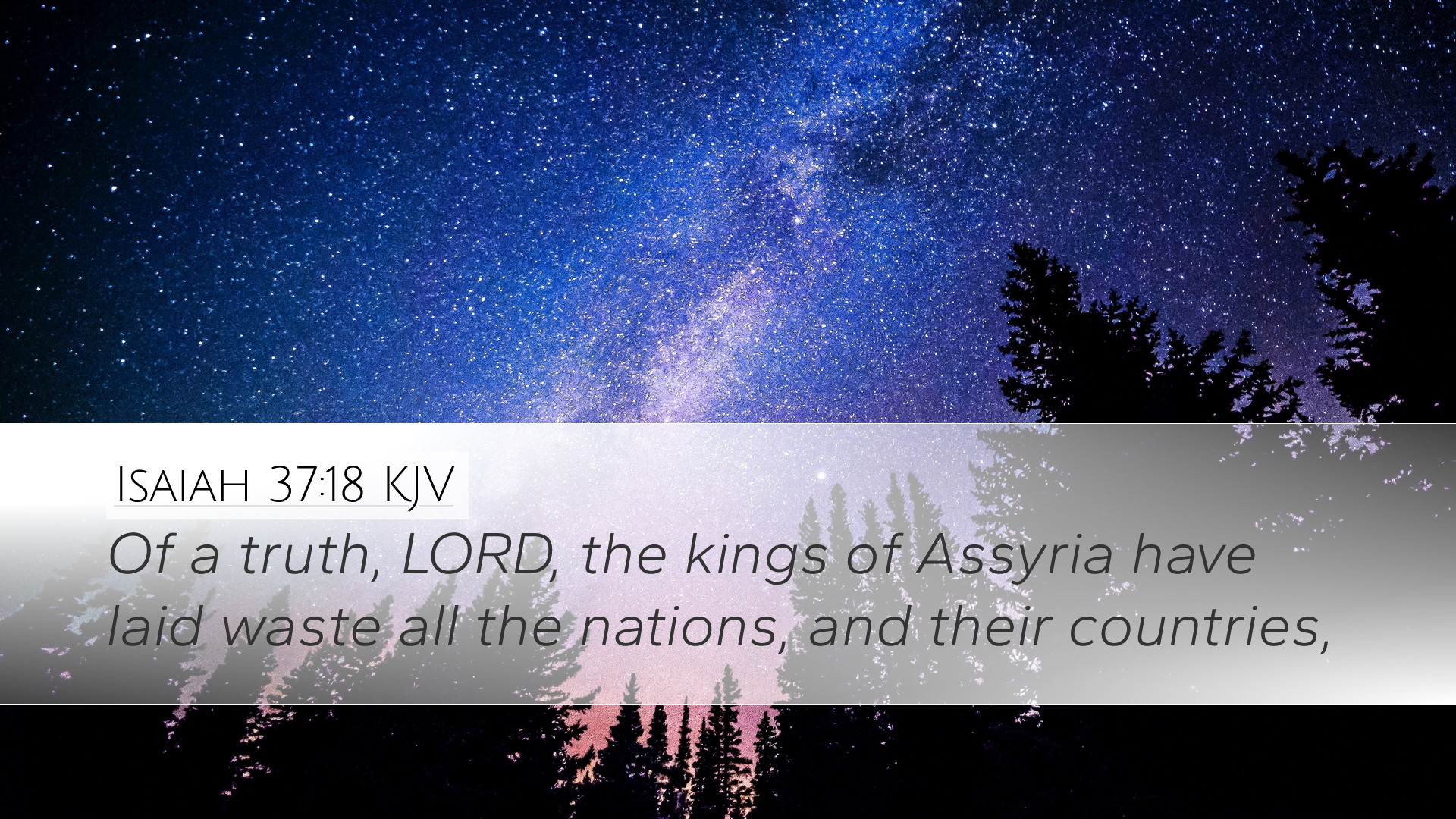Commentary on Isaiah 37:18
Verse Context: Isaiah 37:18 reads, “Of a truth, Lord, the kings of Assyria have laid waste all the nations, and their countries.” This verse comes in the midst of a historical situation where the Assyrian army, under King Sennacherib, threatens Jerusalem. The contemporary interpretation reveals the tension between human power and divine authority.
Exegesis and Theological Insights
In this brief statement, we observe several key themes that emerge from the verse.
-
Recognition of Assyrian Sovereignty:
Isaiah acknowledges the reality of the Assyrian conquests, affirming that they have indeed ravaged other nations. This recognition is crucial as it demonstrates an understanding of the prevailing political and military landscape (Matthew Henry).
-
Contrast of Human and Divine Power:
The mention of the Assyrian kings serves to juxtapose their apparent strength with God's ultimate power over nations. It is crucial for believers to recognize that while earthly kings and powers may seem dominant, God remains sovereign (Albert Barnes).
-
The Nature of Confession:
Isaiah’s declaration can be seen as a form of confession, acknowledging the serious threat posed by Assyria while simultaneously setting the stage for divine intervention. This mirrors a pattern in scripture where acknowledgment of human limitations leads to divine action (Adam Clarke).
Historical Context
The historical backdrop of Isaiah 37 is vital for understanding the weight of this verse. The Assyrian Empire was a dominant force, known for its brutal military campaigns. Their destruction of nations created a climate of fear. Isaiah, as a prophet, offered hope amidst despair and helplessness.
Application for Modern Readers
This verse and its commentary carry significant implications for modern pastors, students, theologians, and Bible scholars:
-
Understanding Opposition:
Just as Judah faced the overwhelming might of Assyria, contemporary believers encounter contrasting forces—be they social, political, or ideological. Recognizing these forces is the first step toward addressing them faithfully.
-
Trust in God's Sovereignty:
The acknowledgment of Assyrian strength should not lead to despair but a deeper reliance on God's promises. In preaching or teaching, this can serve as a reminder that God remains active and powerful, despite the challenges that believers face.
-
Encouragement in Prayer:
Isaiah’s confession of the Assyrians’ accomplishments is part of a larger prayer where he seeks divine deliverance. This verse encourages a heartfelt appeal to God in prayer for help against overwhelming circumstances.
Integration with Other Scriptures
This theme of divine sovereignty over seemingly powerful human forces is echoed throughout the Bible. Examples include:
-
Psalms 46:1-2:
“God is our refuge and strength, a very present help in trouble.” This verse reinforces the theme of God’s protective power against oppressors.
-
Romans 8:31:
“If God be for us, who can be against us?” This New Testament affirmation parallels Isaiah’s recognition of divine strength over earthly threats.
Conclusion
In Isaiah 37:18, we see a profound message encapsulated in a simple admission of the power of the Assyrian kings. Yet, the underlying message is one of hope and faith. For theologians and scholars, this verse is an invitation to meditate on the nature of power, the effectiveness of prayer, and the unchanging sovereignty of God through time. As such, it remains a powerful text for reflection and preaching, leading us to consider where we place our trust in the face of adversity.


